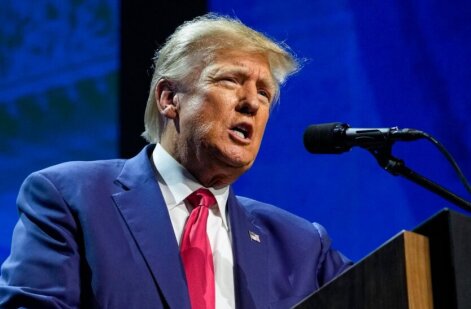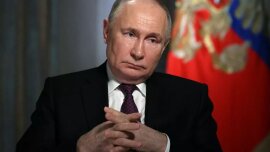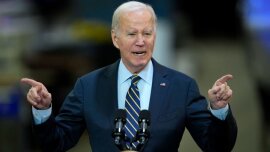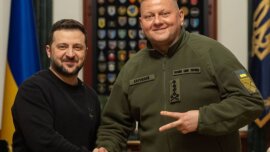Readers are presented with the results and analysis of an ECFR (European Council on Foreign Relations) survey conducted in January of this year in 12 European countries: Austria, France, Germany, Greece, Hungary, Italy, the Netherlands, Poland, Portugal, Romania, Spain and Sweden.
Why is it important to track surveys like these? Wars start on the battlefield, but often end in the voting booth. History knows many cases where it was the decline of public support and military failures that pushed the participants to resolve the situation, for example, the French campaign in Algeria or the US war in Vietnam.
As I wrote earlier in my New Year’s forecast, 2024 is a record year for the number of elections, and the results of some of them can most directly affect the state of affairs both at the front and in our rear. Europeans will take part in elections to the European Parliament in June, presidential and parliamentary elections will be held in some EU countries, and we are all anxiously following the twists and turns of the presidential race in the United States.
Predictions of what will happen in this election could influence the military strategies of both Russia and Ukraine, and battlefield dynamics are very likely to influence votes.
The Russian-Ukrainian war is now in its third year, and Putin is banking on Western war fatigue to achieve a Russian victory.
The ideal scenario for him is the fading of interest in this terrible war on the part of both Europeans and Americans, and against this background, the cessation or significant reduction of support for Kyiv by both the United States and Europe. To what extent are such expectations justified? Let's be honest, there are reasons for this, since analysis of the survey results gives a very mixed picture.
European perception of the Russian-Ukrainian war
Europeans are pessimistic about the outcome of the Russian-Ukrainian war. When it began, they reacted to it with great concern and unusual solidarity towards Ukraine.
The successes of the Ukrainian army at the beginning of the war, the rapid liberation of large territories of the Kharkov and Kherson regions as a result of brilliant military operations, changed the European public perception, when the majority of Europeans wanted to support Ukraine until Ukraine recaptured all of its territory.
Now, with the failure of Ukraine's counteroffensive last year and Russia's relative success at the front, as well as the weakening of US support for Ukraine, some of that optimism has evaporated.
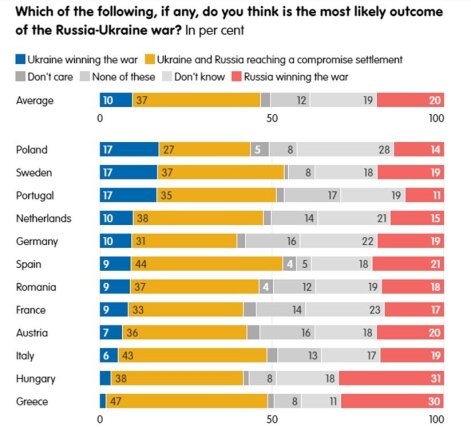
This weak confidence in Ukraine’s chances of winning is visible throughout Europe; the average 10% is a very small figure; twice as many Europeans believe in Russia’s victory.
But as we see, the prevailing answer everywhere is that the war will end with a settlement. Therefore, one should not be surprised that a wide variety of Western politicians periodically start talking about negotiations between Ukraine and Russia; public opinion dominates them.
In connection with the first question, the answers to the question of what specific actions need to be taken in relation to the Russian-Ukrainian war are very interesting.
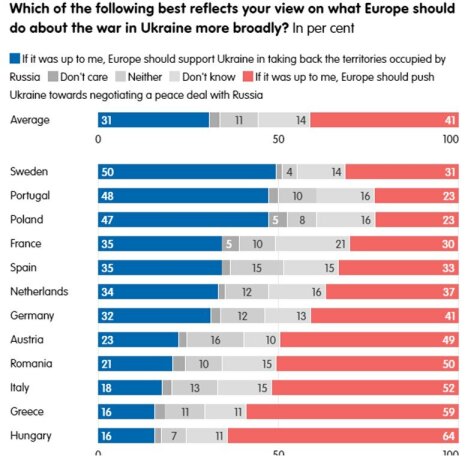
As can be seen from the responses, the expectations and preferences of many Europeans regarding the war in Ukraine vary significantly across countries. Overall, among those who expect Ukraine and Russia to reach a peaceful settlement, half (52%) would prefer to “push” Ukraine to make such a decision, and a third (32%) would prefer to support Ukraine in liberating its territory.
Look carefully at the results and then correlate this with the statements and actions of European politicians, such as Scholz and Macron, in order to understand what is behind it.
European perception of Ukrainian refugees
There is a significant change in the geography of support for our country. Previously, Ukraine's closest neighbors were among its biggest supporters. This was the case in terms of state support and openness to accepting Ukrainian refugees.
But Ukraine currently enjoys its strongest public support in geographically distant Portugal and France, while solidarity among its immediate neighbors wavers.
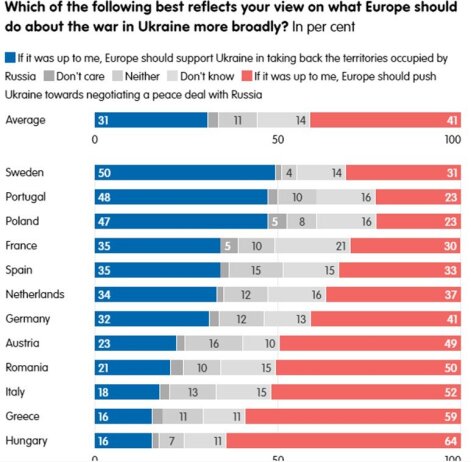
As we see, the “revolts” of Polish farmers have strong public support. The danger with these results is that when it comes to Ukraine's integration into the European Union, our immediate neighbors may become some of our fiercest critics rather than our fiercest defenders.
European perception of events in Gaza
While a significant proportion of Europeans, about a third, recognize that the war in Ukraine is a key event affecting their country and Europe as a whole, a growing number of respondents believe that events in Gaza could have equally serious consequences.
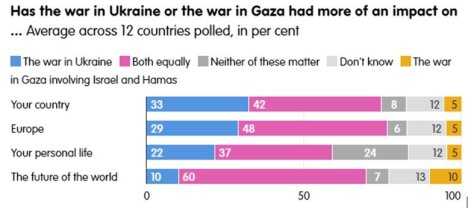
Trump's ghost haunts Europe
Trump, without even becoming the next US president, is already exerting a huge influence on European public opinion in relation to the Russian-Ukrainian war.
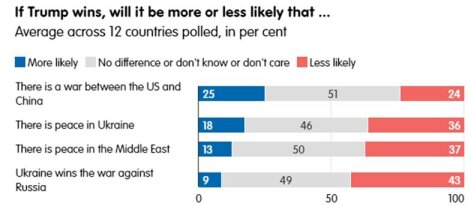
As we can see, in comparison with the very first picture, if Trump returns to power, the number of “pessimists” who do not believe in Ukraine’s victory, on average in Europe, doubles. It is interesting that a significant part of the respondents, almost half, found it difficult to give an unambiguous assessment. This is due to the fact that the worst fears of Europeans from Trump's first term did not come true.
Then he failed, despite all his belligerent statements, to either destroy NATO or start big trade wars with Europe. It seems that most are expecting something similar: a lot of noise, PR, but nothing catastrophic for transatlantic unity. I must say that they are deeply mistaken in their hopes.
An analysis of Trump’s election program “Agenda 47,” which I published earlier , where the main step in its implementation should be considered his intention to “cleanse” the state apparatus, shows that this time neither the States themselves, nor Europe, nor Ukraine, nor the world In general, they won’t get off that easy.
And in light of the very likely “withdrawal” of the United States from Europe in general and from Ukraine in particular, the reaction of European society to such changes becomes very important.
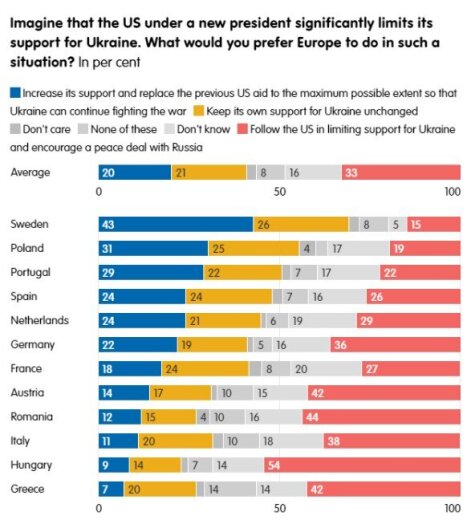
We can confidently say that Europeans, on average in hospitals, are not particularly heroic. In the event of a significant reduction in American aid to our country, only 20% would like Europe to increase its support for Ukraine.
Conclusions: “doves” vs “hawks”
When the Russo-Ukrainian War began, the main clash in Europe was between those who believed that Ukraine should win (the "Party of Justice") and those who preferred that the war end as quickly as possible, regardless of the cost to Ukraine (the "Party of Justice"). peace"). But now another division appears to have emerged around the idea of ending the war. The main question becomes what exactly can be considered success or failure.
Many Europeans now view some form of settlement as peace; others think that the only peace is Ukraine with restored borders. The war in Ukraine is turning into part of the European “cultural war”, when the ideas of pro- and anti-Europeans collide.
Such a paradigm shift is very dangerous: if Putin and Trump manage to dress up in the mantle of “doves of peace”, act as sort of “appeasers”, portray Ukraine and its supporters as “hawks” advocating “eternal war”, then they can lay claim to significant share of public support in Europe.
It is imperative that our country does everything possible to prevent the truth from being distorted. The challenge is to explain to European public opinion what it means in practice to advocate “peace.”
The deafening failure of our information policy in the West last year, caused primarily by Zelensky’s manic desire to pull the “PR blanket” exclusively to himself, should not be repeated this year.
Our diverse political and social leaders, artists and military personnel, temporary refugees and diaspora living in European countries for decades need to make ordinary EU residents understand the difference between the “Ukrainian world” and the “world on Russian terms.”
If ordinary people see that a Russian victory will prevent Ukraine from realizing its European aspirations, that such a “Russian peace” will be a defeat not only for us, but for all of Europe, then they may change their minds and understand that a Russian victory is not peace , but a postponed war. And a change in public opinion in our favor will have a significant impact on Western politicians in their determination and actions to support our country.
